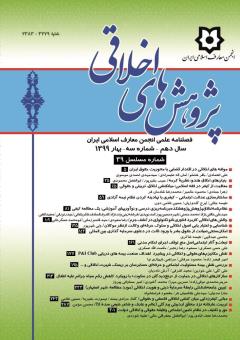بررسی نقش بیمه مسئولیت اجتماعی و حرفهای حسابرسان بر ریسک شهرت اخلاقی و کیفیت حسابرسی با استفاده از رویکرد دلفی و معادلات ساختاری
محورهای موضوعی : اخلاق و تربیت اسلامی
علی گلی
1
,
علی خوزین
2
![]() ,
مجید اشرفی
3
,
آرش نادریان
4
,
مجید اشرفی
3
,
آرش نادریان
4
1 - دانشگاه آزاداسلامی و احد علی آباد
2 - گروه حسابداری، واحد علی آباد کتول، دانشگاه آزاد اسلامی، علی آبادکتول، ایران
3 - دانشگاه آزاداسلامی،واحدعلیآبادکتول
4 - دانشگاه آزاداسلامی،واحدعلیآبادکتول
کلید واژه: ریسک شهرت اخلاقی , کیفیت حسابرسی, بیمه مسئولیت اجتماعی و حرفهای حسابرسان, معادلات ساختاری,
چکیده مقاله :
این پژوهش به بررسی بررسی نقش بیمه مسئولیت اجتماعی و حرفهای حسابرسان بر ریسک شهرت اخلاقی و کیفیت حسابرسی با استفاده از رویکرد دلفی پرداخته است. یکی از روشهای از بین بردن ریسک، انتقال ریسک میباشد و از آنجائیکه حسابرسان به دلایل مختلف از جمله قصور ممکن است با ریسکهایی مواجه شوند، بیمه مسئولیت حرفهای در این بین برای آنها راهگشا است. این مطالعه از طریق رویکرد دلفی و براساس 95 پرسشنامه تکمیل شده توسط حسابرسان در سال 1397 صورت گرفت. با استفاده از روش معادلات ساختاری نتایج فرضیه اول نشان داد که حسابرسان مستقل بیمه مسئولیت اجتماعی و حرفهای را بر کاهش ریسک شهرت خود مؤثر میدانند و ارتباط مثبت و معناداری میان بیمه مسئولیت اجتماعی و حرفهای و کاهش ریسک شهرت اخلاقی حسابرسان وجود دارد. در ارتباط با فرضیه دوم نتایج نشان داد که بیمه مسئولیت اجتماعی و حرفهای منجر به کاهش کیفیت حسابرسی میشود
This research investigates the role of auditors' social and professional liability insurance on the risk of reputation and quality of audit using the Delphi approach. One way to eliminate risk is to transfer risk, and since auditors may face some risks for various reasons, such as failures, professional liability insurance is at stake for them. This study was conducted using a Delphi approach based on 95 questionnaires completed by the auditors in 2018. Using by Structural Equations the results of the first hypothesis showed that independent auditors consider social and professional liability insurance to reduce the risk of their reputation and there is a negative and significant relationship between social insurance and professional liability insurance and the risk of auditors' reputation. The association with the second hypothesis of the results showed that social and professional liability insurance would reduce audit quality
آقاسی، سعید، قانع، مریم، (1394)، بررسی نقش بیمههای اعتباری ناشی از عدم توانایی پرداخت در مدیریت ریسک اعتباری بانکهابامطالعه موردی شعب بانک ملت استان اصفهان، کنفرانس بینالمللی مدیریت، اقتصاد و سامانههای مالی، دبی.
بهارمقدم، مهدی؛ جوکار، حسین؛ شمسالدینی، کاظم. (1397). بررسی تأثیر کیفیت حسابرسی بر کیفیت اطلاعات حسابداری و عدم اطمینان اطلاعاتی. پژوهشهای کاربردی در گزارشگری مالی.
صالحی حمیدرضا. (1393). بیمه مسؤولیت مدنی مشاغل پزشکی؛ چالشها، ضرورتها و فرصتها. فصلنامه علمی- پژوهشی حقوق پزشکی. ۸ (۲۹): ۱۳۱-۱۶۶.
علی قنبری، مهدی صادقی شاهدانی، نوشین خانی قریه گپی. (1389). تخمین تابع تقاضای بیمه مسئولیت حرفهای پزشکان در ایران. صنعت بیمه، سال بیست و پنجم بهار 1389 شماره 1 (پیاپی 97).
نیکبخت، محمدرضا؛ شعبان زاده، مهدی؛ کنار کار، امین. (1395). رابطه بین حقالزحمه حسابرسی و تجربه حسابرس باکیفیت حسابرسی. فصلنامه مدیریت و حسابداری. دوره دوم-شماره1، ص190 – 208.
داوودی نصر، مجید، طالب نیا، قدرت الله، زویایی، رمضان علی،صالحی امیری، سید رضا (1397)، تبیین الگوی مناسب حسابرسی مسئولیت اجتماعی (اخلاق اجتماعی) شرکتها از دیدگاه حقوق بشر و ارزشهای اجتماعیبا استفاده از رویکرد تحلیل عاملی اکتشافی و مدلسازی معادلات ساختاری فصلنامه علمی پژوهشی دانش حسابداری و حسابرسی مدیریت، سال هفتم، شماره 25.
Chung, H. H.& Wynn, J. P. (2008).Managerial legal liability coverage and earnings conservatism.Journal of Accounting and Economics, 46(1), 135–153.
Core, J. E. (1997).On the corporate demand for directors' and officers' insurance.The Journal of Risk and Insurance, 64(1), 1636–1669.
Frederick J. Fisher,J.D.(2014), TECHNICAL ASPECTS OF PROFESSIONAL LIABILITY CLAIMS, professional Liability insurance, 1-15.
Fung, S.Y.K., Raman, K.K. and Zhu, X.(2017), Does The ( PCAOB ) international inspection program forign clients? Journal of accounting and Economics, 64(1), 15-36
Golli, D,Elefanti, M, Valotti,G(2013),From Corporate To Shared Social Responsibility Community Goverance and Social Capital Creation Through. Collaboration.
Granholm, J.M. ross, k. (2009), evaluation of the Michigan Medical Professional Liability insurance Market, State of Michigan, Office of financial and insurance regulation, Department of Energy, labor and economic growth, Stanley “SKIP” Pruss, director.
Griffith, S. J. (2005).Uncovering a gatekeeper: Why the SEC should mandate disclosure of details concerning directors' and officers' liability insurance policies.University of Pennsylvania Law Review, 154(5), 1147–1208.
Habib, A., Muhammadi, A H., Jiang, H. (2018). Political connections, related party transactions, and auditor.International Journal of Accounting & Information Management, Vol. 26 Issue: 1, pp.59-80, https://doi.org/10.1108/IJAIM-08-2016-0086
Holderness, C. (1990).Liability insurers as corporate monitors.International Review of Law and Economics, 10(2), 115–129.
Houqe ,N., Ahmed, K. and Vanzijl, T. (2015) , Effect of Audit Quality on earnings quality and cost of equity capital : evidence from india .victoria university of wellington . availiable online at : http:// research archarchive . www.ac.nz/handle/ 10063/4173.
Kathryn, A. B. (2013), Food Product Liability Insurance: Implications for the Marketing of Specialty Crops, The magazine of food, farm, and resource, 28(4).
Merchant, Kenneth & Van der Stede, W.A. (2011). Management Control Systems: Performance Measurement, Evaluation and Incentives.
O'Sullivan, N. (1997).Insuring the agents: The role of director's and officers' insurance in corporate governance.The Journal of Risk and Insurance, 64(3), 545–556.
Pratt, J., and J. Stice. (1994). The Effects of Client Characteristics on Auditor Litigation Risk Judgments, Required Audit Evidence and Recommended Audit Fees. The Accounting Review. Vol. 69, Pp. 639–656.
Tevdello, R.,Vanstralen, M. (2008). The effect of audit quality on firm governance. International Journal of Law and Management, Vol. 12 Issue: 2, pp.439-452.
Wynn, J. P. (2008).Legal liability coverage and voluntary disclosure.The Accounting Review, 83(6), 1639–1669.
1. Structural Equation Modeling (SEM)
2. Partial least Squares (PLS)


